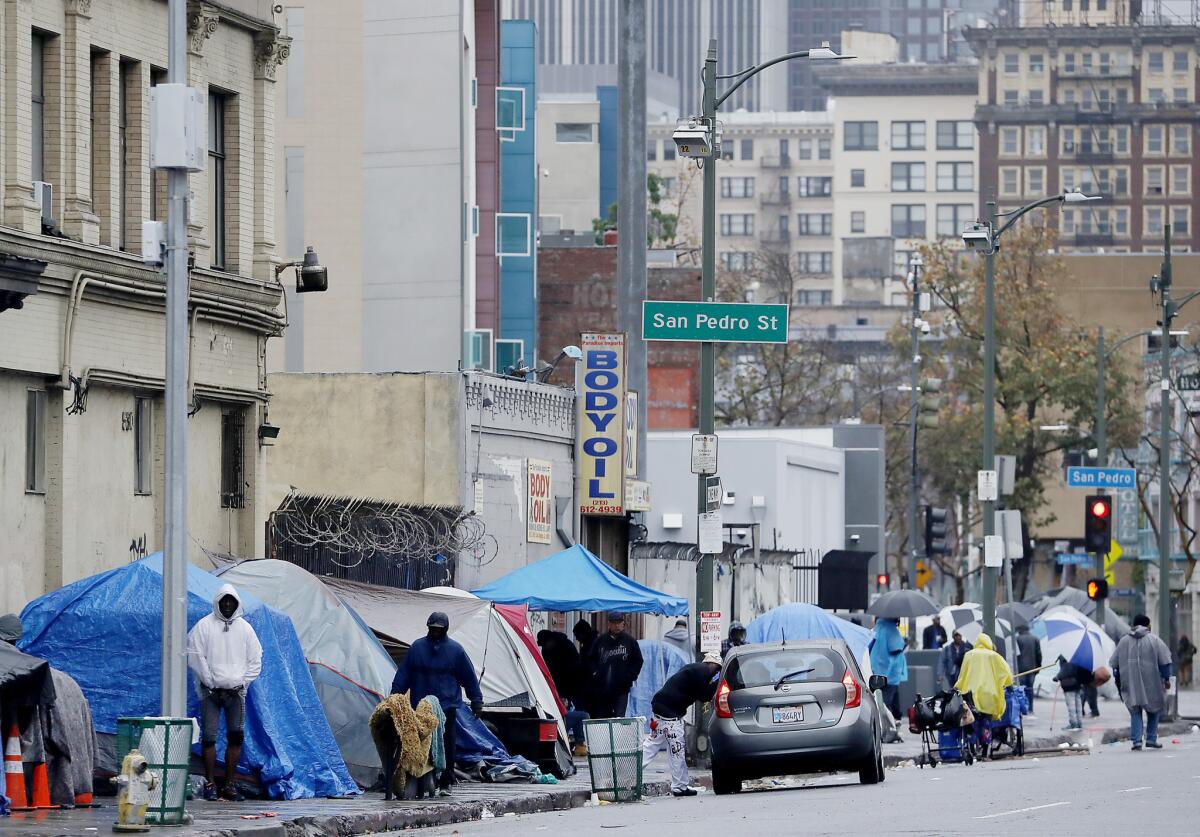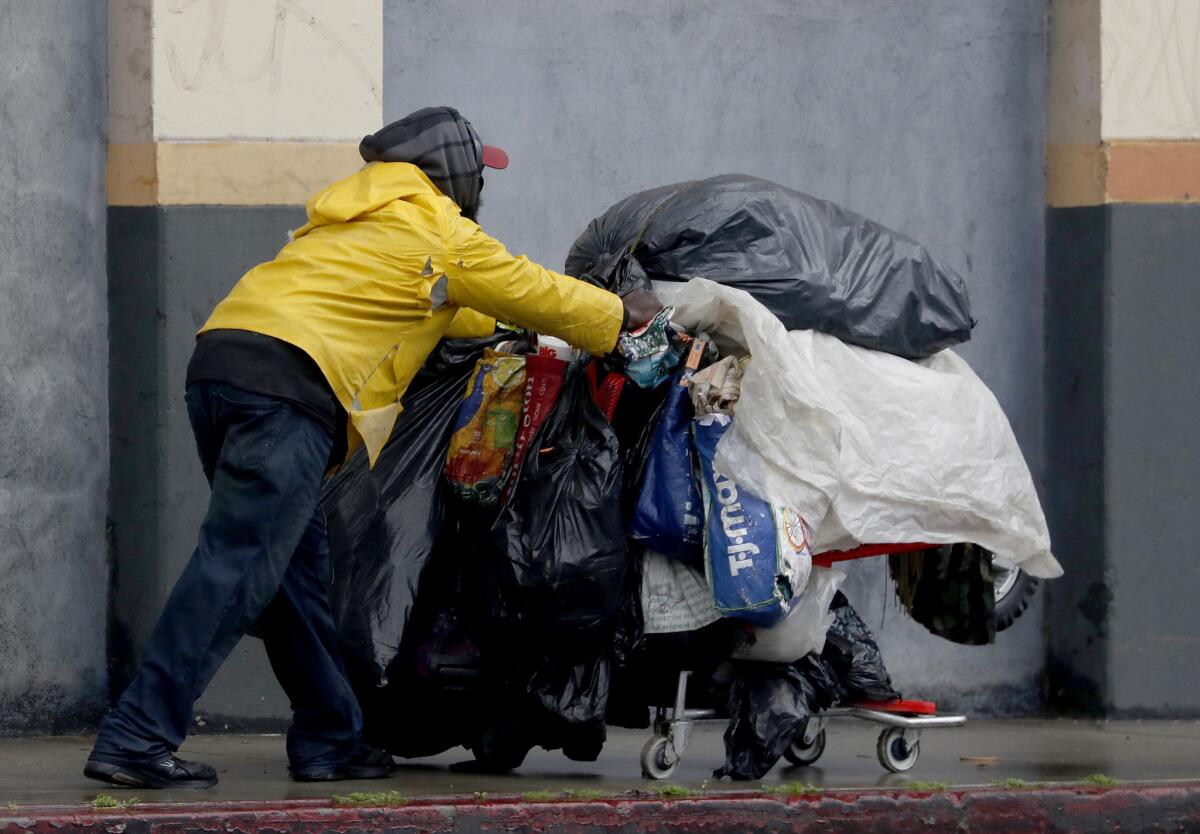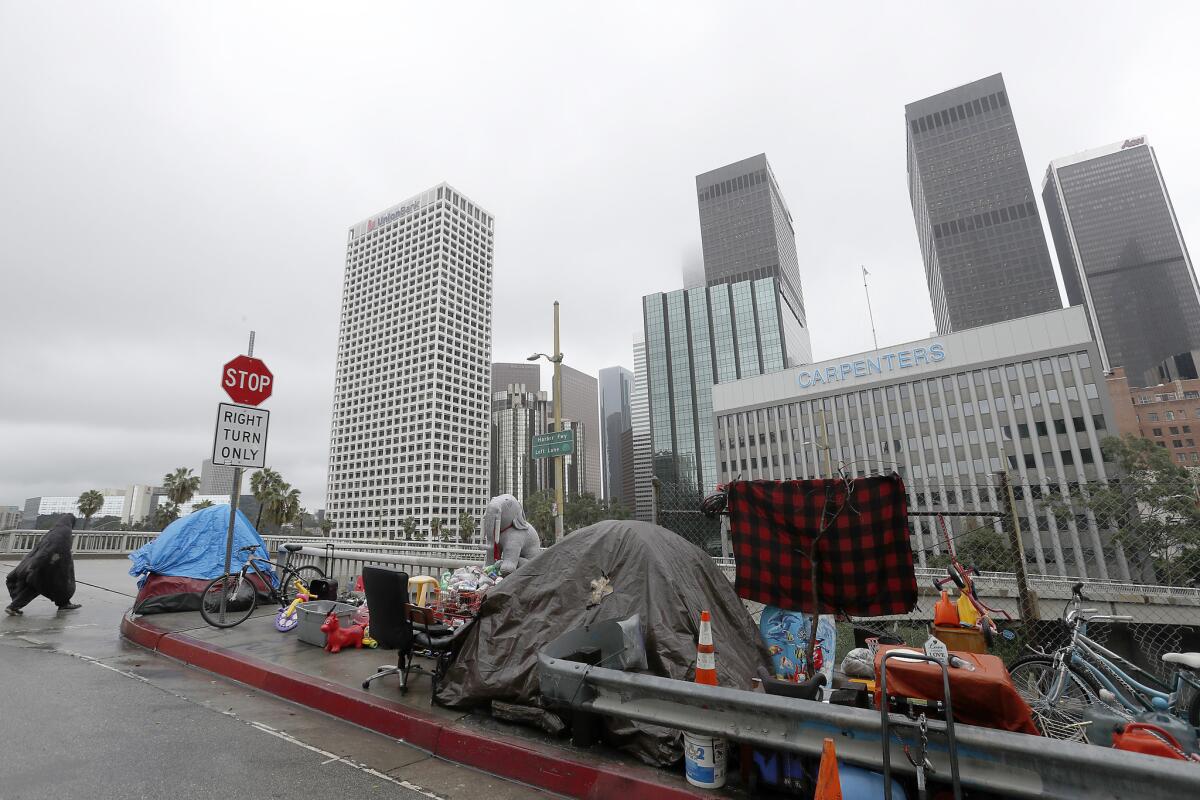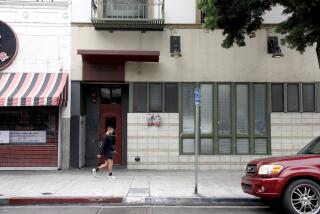L.A. settles homeless rights case, likely limiting ability to clear skid row streets

- Share via
The Los Angeles City Council on Wednesday agreed to settle a pivotal and contentious case on the property rights of homeless people — a decision that is likely to limit the seizure and destruction of encampments on skid row.
The 10-2 vote authorizes City Attorney Mike Feuer to settle a 2016 lawsuit, Carl Mitchell v. Los Angeles, brought by civil rights lawyers on behalf of homeless people and two skid row anti-poverty groups. Downtown business groups had opposed such a deal, arguing that settling the case would deter redevelopment, and leave skid row and the people who live on its sidewalks mired in squalor.
The city has wrestled with the property rights issue for years, losing or settling a string of civil rights lawsuits related to cleaning up tent encampments downtown
In 2016, L.A. adopted an ordinance limiting homeless people’s belongings to what would fit in a 60-gallon bag, and requiring the city to give 24-hour notice of cleanups and store confiscated items where they can be readily reclaimed.
But after civil rights lawyers filed the lawsuit that same year, alleging that the city used street cleanups and arrests for minor “quality of life” offenses as pretexts to dismantle their camps and destroy their property, U.S. District Judge S. James Otero in Los Angeles issued an injunction. It barred the city from seizing and destroying homeless people’s property on skid row unless officials could show it had been abandoned, threatened public health or safety, or consisted of contraband or evidence of a crime.
Developers and business representatives had lobbied the City Council to take the judge’s injunction to trial instead of preserving many of its requirements in a settlement. They argue the injunction has hampered police enforcement on skid row and fostered disorder and disease, including a typhus outbreak.

The council left the details of the settlement, including exactly what streets would be covered, to City Attorney Feuer. At least one downtown business group assailed council members for agreeing to terms without making them public.
But Councilman Jose Huizar, who voted against the deal on Wednesday, said the settlement would only cover skid row, home to more than 2,000 people who live outdoors, and adjoining streets, including part of Little Tokyo and Main Street. Other parts of Los Angeles would not be affected.
The city, Huizar said, was continuing “to treat skid row as a dumping ground for homeless people.”
Councilman Joe Buscaino, who also opposed the settlement, predicted conditions on skid row would deteriorate even further because of the settlement.
“We deserve a city safe and free of public health hazards,” Buscaino said after the vote. “Every time we propose a solution (to homelessness) we get slammed for it.”
But Councilman Marqueece Harris-Dawson said a lack of money is stopping the city from cleaning up skid row, not the judge’s injunction. The city’s annual cleanup costs soared to $31 million last year.
“Most districts in the rest of the city don’t have the resources to implement (ordinance) 56.11,” the city’s law governing the storage of homeless people’s property on sidewalks and in other public places, Harris-Dawson said. “We just don’t have the capacity.”
The council’s decision Wednesday followed more than three hours of closed-door deliberations. Four public hearings have been held on the issue in recent months, including three before the city’s Homelessness and Poverty Committee.
Details of the settlement remain unclear, though.
“The testimony at the past three homelessness and poverty committee meetings and [the] council meeting today showcase the broad concerns of continuing the status quo, and how we need a new approach to the cycle of lawsuits the city faces and solving our region’s homelessness crisis with the decision,” said Jessica Lall, president and chief executive officer of the Central City Association.
During the public comment period Wednesday, downtown business leader Carol Schatz told the council that the city had mortgaged its future in a “misguided attempt to buy temporary peace with activists.”
But skid row residents and anti-poverty activists said the judge’s injunction — parts of which are likely to be preserved in the settlement — help homeless people hang on to medication, identity documents, and other belongings critical to their survival. Otero had cited the city’s confiscation of a homeless man’s medication in his 2016 order.

Homeless advocates also argued that said business groups want to criminalize homeless people, making it harder for them to get off the streets.
”The business community has done a great job at confusing the issue,” Steve Diaz with the Los Angeles Community Action Network, an anti-poverty group involved in the 2016 lawsuit, told the council Wednesday. “Encampments do not come from homeless people’s constitutional rights. They come because of a lack of housing and lack of affordability.”
In his council office after the meeting, Harris-Dawson said he did not expect the settlement to hurt or help skid row. Rather, he said, it would make it clear what the city can do as it works to improve the homeless enclave.
“I don’t expect it to create worse conditions,” Harris-Dawson said. “Skid row is a problem that accumulated over 50 years. This will make the rules clear...so we can focus on getting people housed.”
Twitter: @geholland
More to Read
Sign up for Essential California
The most important California stories and recommendations in your inbox every morning.
You may occasionally receive promotional content from the Los Angeles Times.













